Public Health Policy: Analyzing Policy Cycle and Social Determinants
VerifiedAdded on 2023/06/13
|6
|2033
|292
Homework Assignment
AI Summary
This assignment provides a detailed exploration of key concepts in public health policy. It begins by examining the policy cycle as a tool for new policy development, highlighting its descriptive and prescriptive nature, its ability to accurately identify problems and alternative policies, and its role in fostering rational decision-making. The assignment then delves into the sociological factors influencing health status, focusing on the impact of income, social status, education, and social norms. Furthermore, it discusses the role of power in policy development, emphasizing the influence of politics and the importance of understanding the political process for policy adoption and implementation. The assignment also addresses policy considerations crucial for increasing the effectiveness of new policies, such as data analysis, sustainability, intervention appropriateness, budget adequacy, and stakeholder engagement. Finally, it outlines the factors to be included in a new policy for developing a smoke-free environment in a university, including clear objectives, interventions, stakeholder involvement, and a monitoring and evaluation framework. This assignment is available on Desklib, a platform offering a wide range of study tools and resources for students.
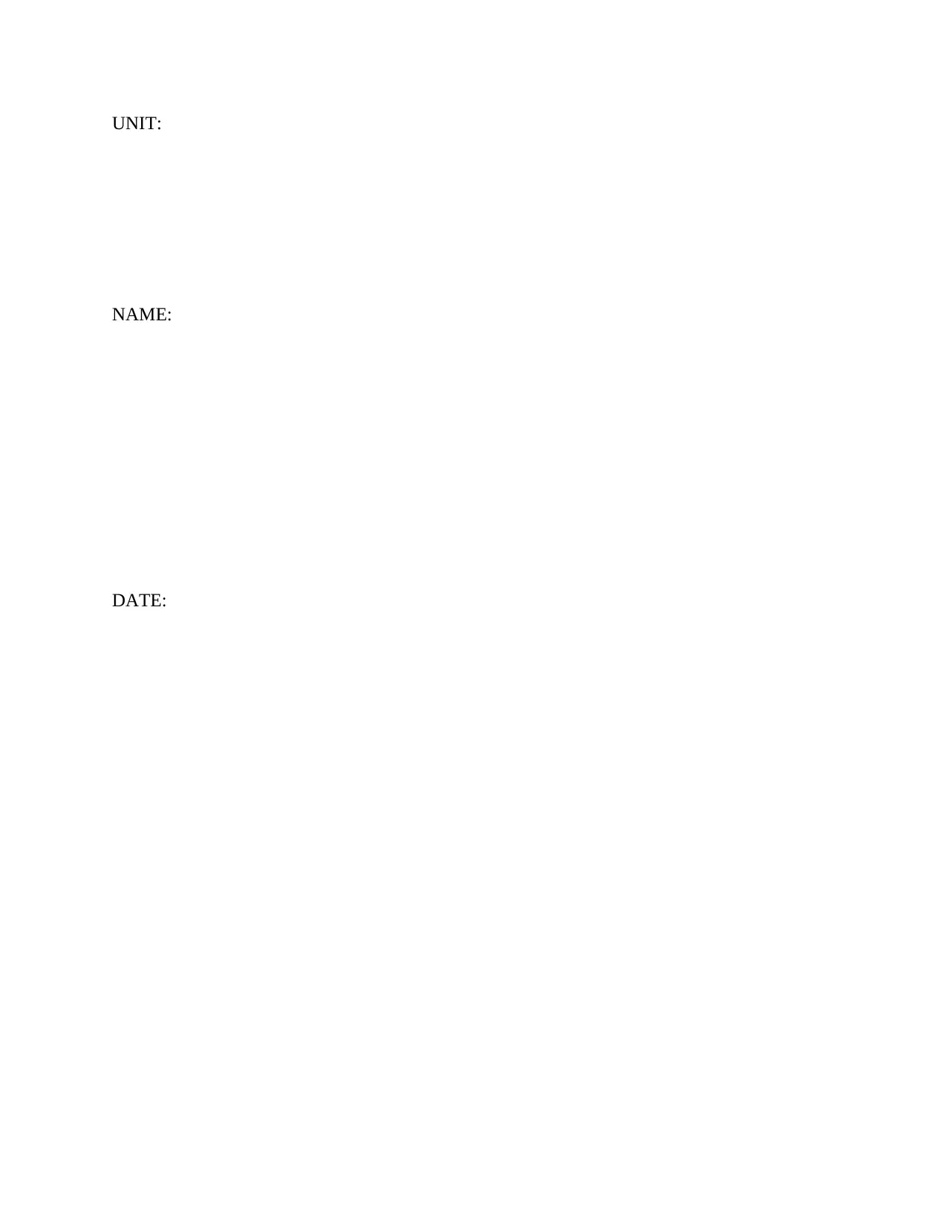
UNIT:
NAME:
DATE:
NAME:
DATE:
Paraphrase This Document
Need a fresh take? Get an instant paraphrase of this document with our AI Paraphraser
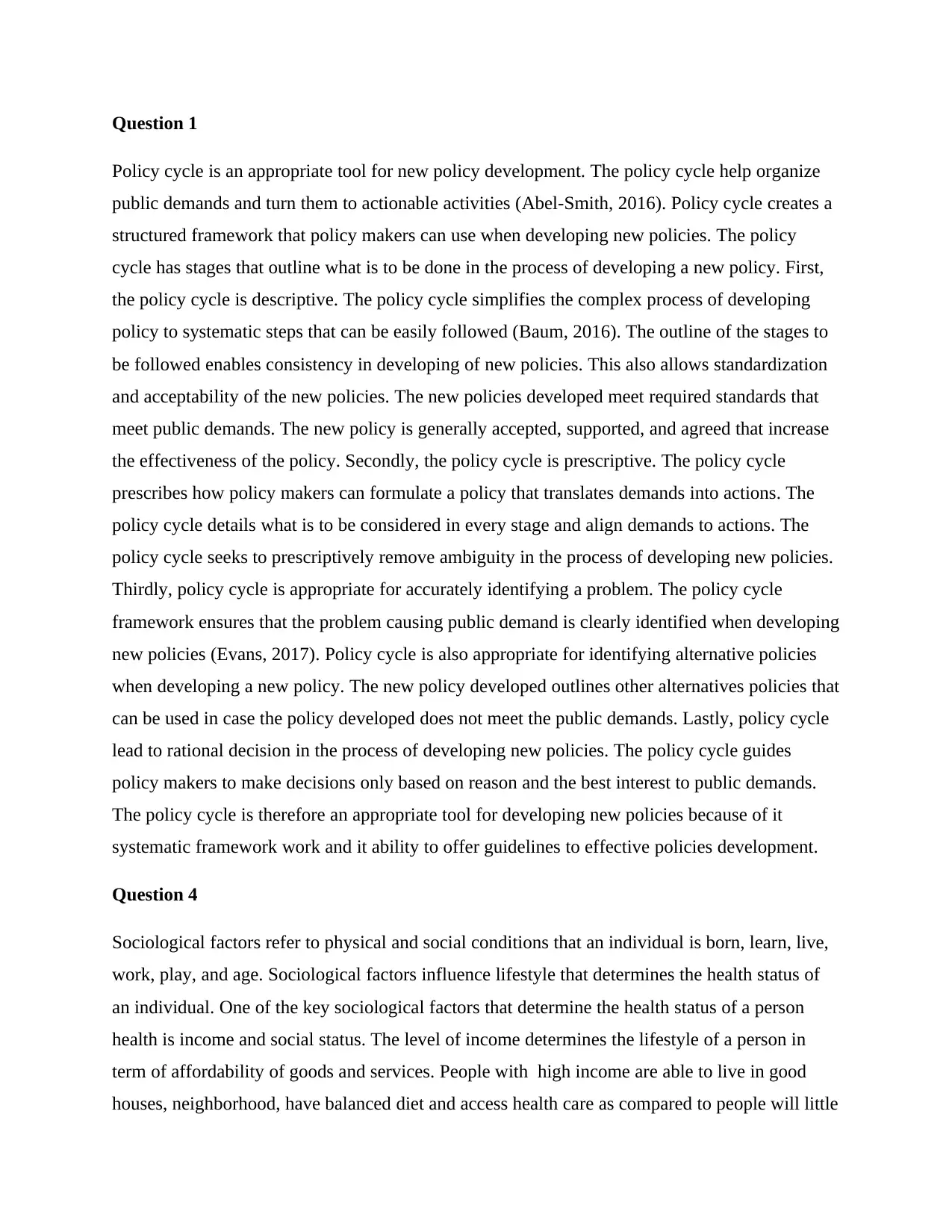
Question 1
Policy cycle is an appropriate tool for new policy development. The policy cycle help organize
public demands and turn them to actionable activities (Abel-Smith, 2016). Policy cycle creates a
structured framework that policy makers can use when developing new policies. The policy
cycle has stages that outline what is to be done in the process of developing a new policy. First,
the policy cycle is descriptive. The policy cycle simplifies the complex process of developing
policy to systematic steps that can be easily followed (Baum, 2016). The outline of the stages to
be followed enables consistency in developing of new policies. This also allows standardization
and acceptability of the new policies. The new policies developed meet required standards that
meet public demands. The new policy is generally accepted, supported, and agreed that increase
the effectiveness of the policy. Secondly, the policy cycle is prescriptive. The policy cycle
prescribes how policy makers can formulate a policy that translates demands into actions. The
policy cycle details what is to be considered in every stage and align demands to actions. The
policy cycle seeks to prescriptively remove ambiguity in the process of developing new policies.
Thirdly, policy cycle is appropriate for accurately identifying a problem. The policy cycle
framework ensures that the problem causing public demand is clearly identified when developing
new policies (Evans, 2017). Policy cycle is also appropriate for identifying alternative policies
when developing a new policy. The new policy developed outlines other alternatives policies that
can be used in case the policy developed does not meet the public demands. Lastly, policy cycle
lead to rational decision in the process of developing new policies. The policy cycle guides
policy makers to make decisions only based on reason and the best interest to public demands.
The policy cycle is therefore an appropriate tool for developing new policies because of it
systematic framework work and it ability to offer guidelines to effective policies development.
Question 4
Sociological factors refer to physical and social conditions that an individual is born, learn, live,
work, play, and age. Sociological factors influence lifestyle that determines the health status of
an individual. One of the key sociological factors that determine the health status of a person
health is income and social status. The level of income determines the lifestyle of a person in
term of affordability of goods and services. People with high income are able to live in good
houses, neighborhood, have balanced diet and access health care as compared to people will little
Policy cycle is an appropriate tool for new policy development. The policy cycle help organize
public demands and turn them to actionable activities (Abel-Smith, 2016). Policy cycle creates a
structured framework that policy makers can use when developing new policies. The policy
cycle has stages that outline what is to be done in the process of developing a new policy. First,
the policy cycle is descriptive. The policy cycle simplifies the complex process of developing
policy to systematic steps that can be easily followed (Baum, 2016). The outline of the stages to
be followed enables consistency in developing of new policies. This also allows standardization
and acceptability of the new policies. The new policies developed meet required standards that
meet public demands. The new policy is generally accepted, supported, and agreed that increase
the effectiveness of the policy. Secondly, the policy cycle is prescriptive. The policy cycle
prescribes how policy makers can formulate a policy that translates demands into actions. The
policy cycle details what is to be considered in every stage and align demands to actions. The
policy cycle seeks to prescriptively remove ambiguity in the process of developing new policies.
Thirdly, policy cycle is appropriate for accurately identifying a problem. The policy cycle
framework ensures that the problem causing public demand is clearly identified when developing
new policies (Evans, 2017). Policy cycle is also appropriate for identifying alternative policies
when developing a new policy. The new policy developed outlines other alternatives policies that
can be used in case the policy developed does not meet the public demands. Lastly, policy cycle
lead to rational decision in the process of developing new policies. The policy cycle guides
policy makers to make decisions only based on reason and the best interest to public demands.
The policy cycle is therefore an appropriate tool for developing new policies because of it
systematic framework work and it ability to offer guidelines to effective policies development.
Question 4
Sociological factors refer to physical and social conditions that an individual is born, learn, live,
work, play, and age. Sociological factors influence lifestyle that determines the health status of
an individual. One of the key sociological factors that determine the health status of a person
health is income and social status. The level of income determines the lifestyle of a person in
term of affordability of goods and services. People with high income are able to live in good
houses, neighborhood, have balanced diet and access health care as compared to people will little
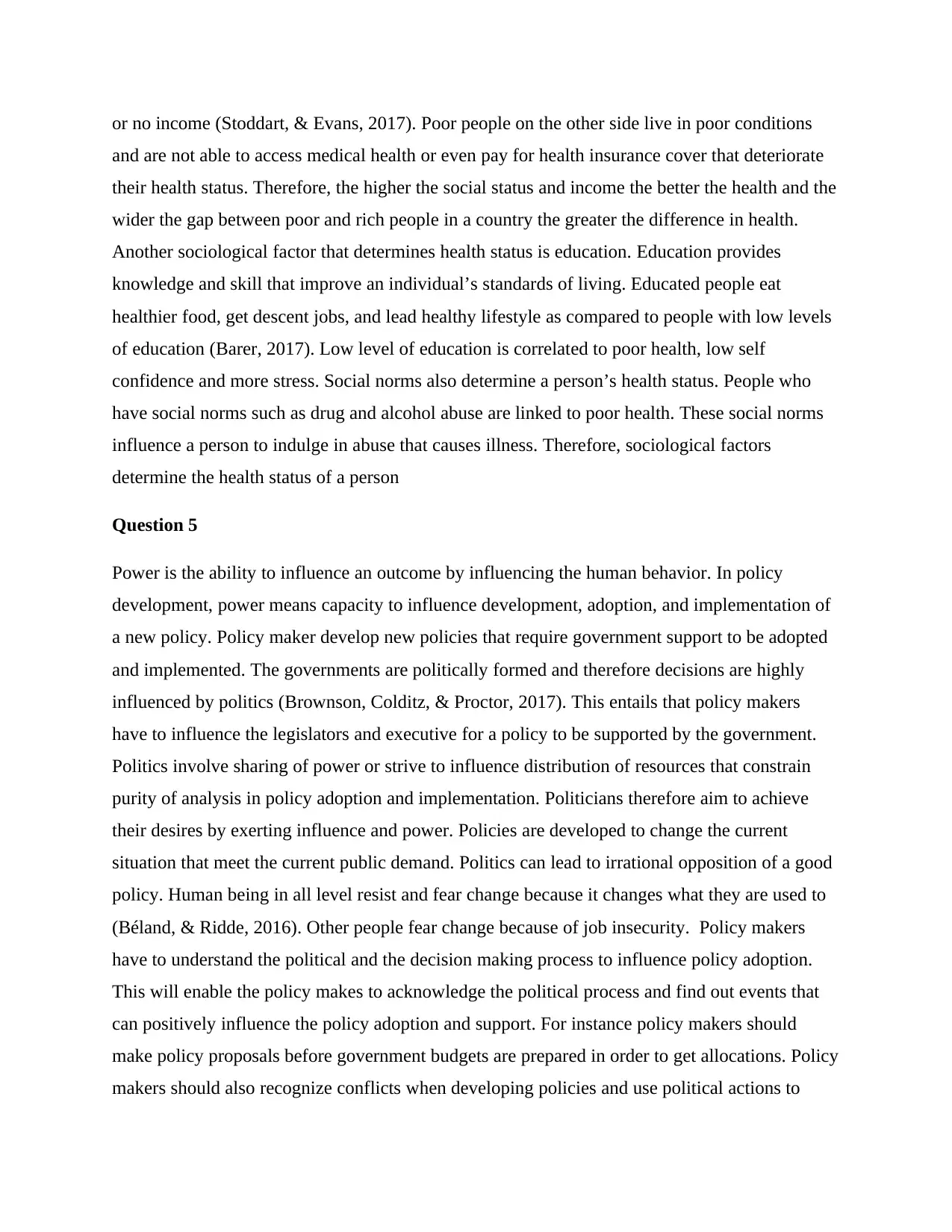
or no income (Stoddart, & Evans, 2017). Poor people on the other side live in poor conditions
and are not able to access medical health or even pay for health insurance cover that deteriorate
their health status. Therefore, the higher the social status and income the better the health and the
wider the gap between poor and rich people in a country the greater the difference in health.
Another sociological factor that determines health status is education. Education provides
knowledge and skill that improve an individual’s standards of living. Educated people eat
healthier food, get descent jobs, and lead healthy lifestyle as compared to people with low levels
of education (Barer, 2017). Low level of education is correlated to poor health, low self
confidence and more stress. Social norms also determine a person’s health status. People who
have social norms such as drug and alcohol abuse are linked to poor health. These social norms
influence a person to indulge in abuse that causes illness. Therefore, sociological factors
determine the health status of a person
Question 5
Power is the ability to influence an outcome by influencing the human behavior. In policy
development, power means capacity to influence development, adoption, and implementation of
a new policy. Policy maker develop new policies that require government support to be adopted
and implemented. The governments are politically formed and therefore decisions are highly
influenced by politics (Brownson, Colditz, & Proctor, 2017). This entails that policy makers
have to influence the legislators and executive for a policy to be supported by the government.
Politics involve sharing of power or strive to influence distribution of resources that constrain
purity of analysis in policy adoption and implementation. Politicians therefore aim to achieve
their desires by exerting influence and power. Policies are developed to change the current
situation that meet the current public demand. Politics can lead to irrational opposition of a good
policy. Human being in all level resist and fear change because it changes what they are used to
(Béland, & Ridde, 2016). Other people fear change because of job insecurity. Policy makers
have to understand the political and the decision making process to influence policy adoption.
This will enable the policy makes to acknowledge the political process and find out events that
can positively influence the policy adoption and support. For instance policy makers should
make policy proposals before government budgets are prepared in order to get allocations. Policy
makers should also recognize conflicts when developing policies and use political actions to
and are not able to access medical health or even pay for health insurance cover that deteriorate
their health status. Therefore, the higher the social status and income the better the health and the
wider the gap between poor and rich people in a country the greater the difference in health.
Another sociological factor that determines health status is education. Education provides
knowledge and skill that improve an individual’s standards of living. Educated people eat
healthier food, get descent jobs, and lead healthy lifestyle as compared to people with low levels
of education (Barer, 2017). Low level of education is correlated to poor health, low self
confidence and more stress. Social norms also determine a person’s health status. People who
have social norms such as drug and alcohol abuse are linked to poor health. These social norms
influence a person to indulge in abuse that causes illness. Therefore, sociological factors
determine the health status of a person
Question 5
Power is the ability to influence an outcome by influencing the human behavior. In policy
development, power means capacity to influence development, adoption, and implementation of
a new policy. Policy maker develop new policies that require government support to be adopted
and implemented. The governments are politically formed and therefore decisions are highly
influenced by politics (Brownson, Colditz, & Proctor, 2017). This entails that policy makers
have to influence the legislators and executive for a policy to be supported by the government.
Politics involve sharing of power or strive to influence distribution of resources that constrain
purity of analysis in policy adoption and implementation. Politicians therefore aim to achieve
their desires by exerting influence and power. Policies are developed to change the current
situation that meet the current public demand. Politics can lead to irrational opposition of a good
policy. Human being in all level resist and fear change because it changes what they are used to
(Béland, & Ridde, 2016). Other people fear change because of job insecurity. Policy makers
have to understand the political and the decision making process to influence policy adoption.
This will enable the policy makes to acknowledge the political process and find out events that
can positively influence the policy adoption and support. For instance policy makers should
make policy proposals before government budgets are prepared in order to get allocations. Policy
makers should also recognize conflicts when developing policies and use political actions to
⊘ This is a preview!⊘
Do you want full access?
Subscribe today to unlock all pages.

Trusted by 1+ million students worldwide
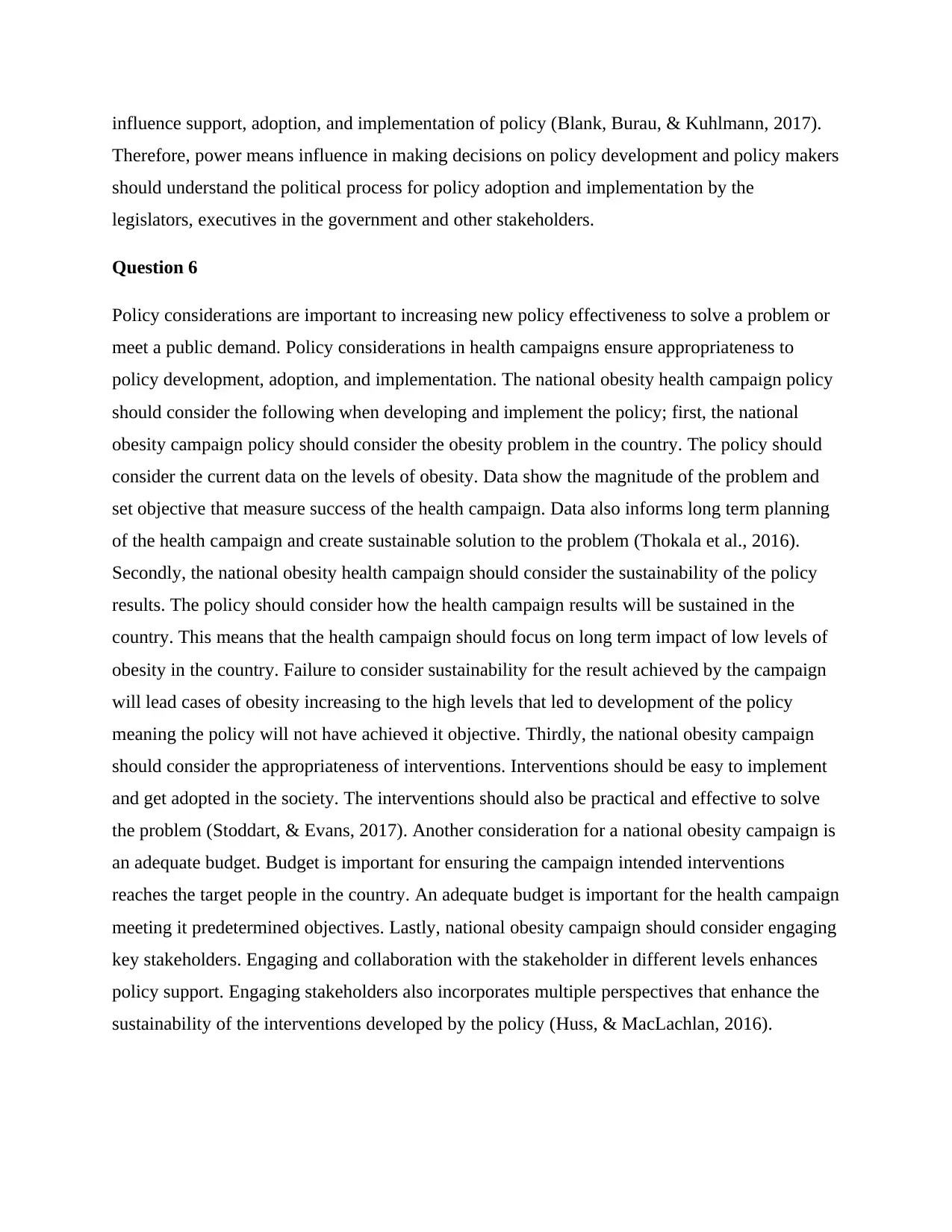
influence support, adoption, and implementation of policy (Blank, Burau, & Kuhlmann, 2017).
Therefore, power means influence in making decisions on policy development and policy makers
should understand the political process for policy adoption and implementation by the
legislators, executives in the government and other stakeholders.
Question 6
Policy considerations are important to increasing new policy effectiveness to solve a problem or
meet a public demand. Policy considerations in health campaigns ensure appropriateness to
policy development, adoption, and implementation. The national obesity health campaign policy
should consider the following when developing and implement the policy; first, the national
obesity campaign policy should consider the obesity problem in the country. The policy should
consider the current data on the levels of obesity. Data show the magnitude of the problem and
set objective that measure success of the health campaign. Data also informs long term planning
of the health campaign and create sustainable solution to the problem (Thokala et al., 2016).
Secondly, the national obesity health campaign should consider the sustainability of the policy
results. The policy should consider how the health campaign results will be sustained in the
country. This means that the health campaign should focus on long term impact of low levels of
obesity in the country. Failure to consider sustainability for the result achieved by the campaign
will lead cases of obesity increasing to the high levels that led to development of the policy
meaning the policy will not have achieved it objective. Thirdly, the national obesity campaign
should consider the appropriateness of interventions. Interventions should be easy to implement
and get adopted in the society. The interventions should also be practical and effective to solve
the problem (Stoddart, & Evans, 2017). Another consideration for a national obesity campaign is
an adequate budget. Budget is important for ensuring the campaign intended interventions
reaches the target people in the country. An adequate budget is important for the health campaign
meeting it predetermined objectives. Lastly, national obesity campaign should consider engaging
key stakeholders. Engaging and collaboration with the stakeholder in different levels enhances
policy support. Engaging stakeholders also incorporates multiple perspectives that enhance the
sustainability of the interventions developed by the policy (Huss, & MacLachlan, 2016).
Therefore, power means influence in making decisions on policy development and policy makers
should understand the political process for policy adoption and implementation by the
legislators, executives in the government and other stakeholders.
Question 6
Policy considerations are important to increasing new policy effectiveness to solve a problem or
meet a public demand. Policy considerations in health campaigns ensure appropriateness to
policy development, adoption, and implementation. The national obesity health campaign policy
should consider the following when developing and implement the policy; first, the national
obesity campaign policy should consider the obesity problem in the country. The policy should
consider the current data on the levels of obesity. Data show the magnitude of the problem and
set objective that measure success of the health campaign. Data also informs long term planning
of the health campaign and create sustainable solution to the problem (Thokala et al., 2016).
Secondly, the national obesity health campaign should consider the sustainability of the policy
results. The policy should consider how the health campaign results will be sustained in the
country. This means that the health campaign should focus on long term impact of low levels of
obesity in the country. Failure to consider sustainability for the result achieved by the campaign
will lead cases of obesity increasing to the high levels that led to development of the policy
meaning the policy will not have achieved it objective. Thirdly, the national obesity campaign
should consider the appropriateness of interventions. Interventions should be easy to implement
and get adopted in the society. The interventions should also be practical and effective to solve
the problem (Stoddart, & Evans, 2017). Another consideration for a national obesity campaign is
an adequate budget. Budget is important for ensuring the campaign intended interventions
reaches the target people in the country. An adequate budget is important for the health campaign
meeting it predetermined objectives. Lastly, national obesity campaign should consider engaging
key stakeholders. Engaging and collaboration with the stakeholder in different levels enhances
policy support. Engaging stakeholders also incorporates multiple perspectives that enhance the
sustainability of the interventions developed by the policy (Huss, & MacLachlan, 2016).
Paraphrase This Document
Need a fresh take? Get an instant paraphrase of this document with our AI Paraphraser
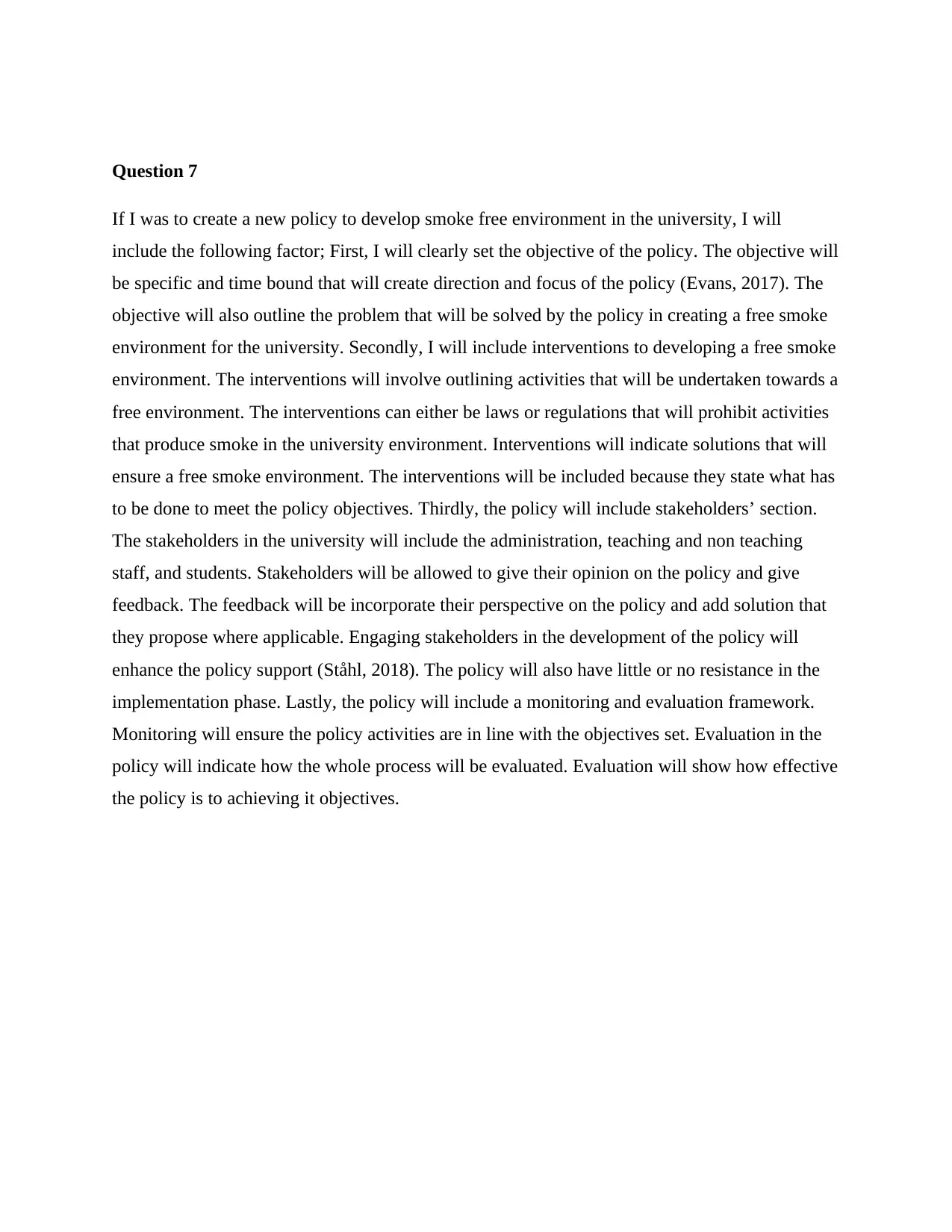
Question 7
If I was to create a new policy to develop smoke free environment in the university, I will
include the following factor; First, I will clearly set the objective of the policy. The objective will
be specific and time bound that will create direction and focus of the policy (Evans, 2017). The
objective will also outline the problem that will be solved by the policy in creating a free smoke
environment for the university. Secondly, I will include interventions to developing a free smoke
environment. The interventions will involve outlining activities that will be undertaken towards a
free environment. The interventions can either be laws or regulations that will prohibit activities
that produce smoke in the university environment. Interventions will indicate solutions that will
ensure a free smoke environment. The interventions will be included because they state what has
to be done to meet the policy objectives. Thirdly, the policy will include stakeholders’ section.
The stakeholders in the university will include the administration, teaching and non teaching
staff, and students. Stakeholders will be allowed to give their opinion on the policy and give
feedback. The feedback will be incorporate their perspective on the policy and add solution that
they propose where applicable. Engaging stakeholders in the development of the policy will
enhance the policy support (Ståhl, 2018). The policy will also have little or no resistance in the
implementation phase. Lastly, the policy will include a monitoring and evaluation framework.
Monitoring will ensure the policy activities are in line with the objectives set. Evaluation in the
policy will indicate how the whole process will be evaluated. Evaluation will show how effective
the policy is to achieving it objectives.
If I was to create a new policy to develop smoke free environment in the university, I will
include the following factor; First, I will clearly set the objective of the policy. The objective will
be specific and time bound that will create direction and focus of the policy (Evans, 2017). The
objective will also outline the problem that will be solved by the policy in creating a free smoke
environment for the university. Secondly, I will include interventions to developing a free smoke
environment. The interventions will involve outlining activities that will be undertaken towards a
free environment. The interventions can either be laws or regulations that will prohibit activities
that produce smoke in the university environment. Interventions will indicate solutions that will
ensure a free smoke environment. The interventions will be included because they state what has
to be done to meet the policy objectives. Thirdly, the policy will include stakeholders’ section.
The stakeholders in the university will include the administration, teaching and non teaching
staff, and students. Stakeholders will be allowed to give their opinion on the policy and give
feedback. The feedback will be incorporate their perspective on the policy and add solution that
they propose where applicable. Engaging stakeholders in the development of the policy will
enhance the policy support (Ståhl, 2018). The policy will also have little or no resistance in the
implementation phase. Lastly, the policy will include a monitoring and evaluation framework.
Monitoring will ensure the policy activities are in line with the objectives set. Evaluation in the
policy will indicate how the whole process will be evaluated. Evaluation will show how effective
the policy is to achieving it objectives.
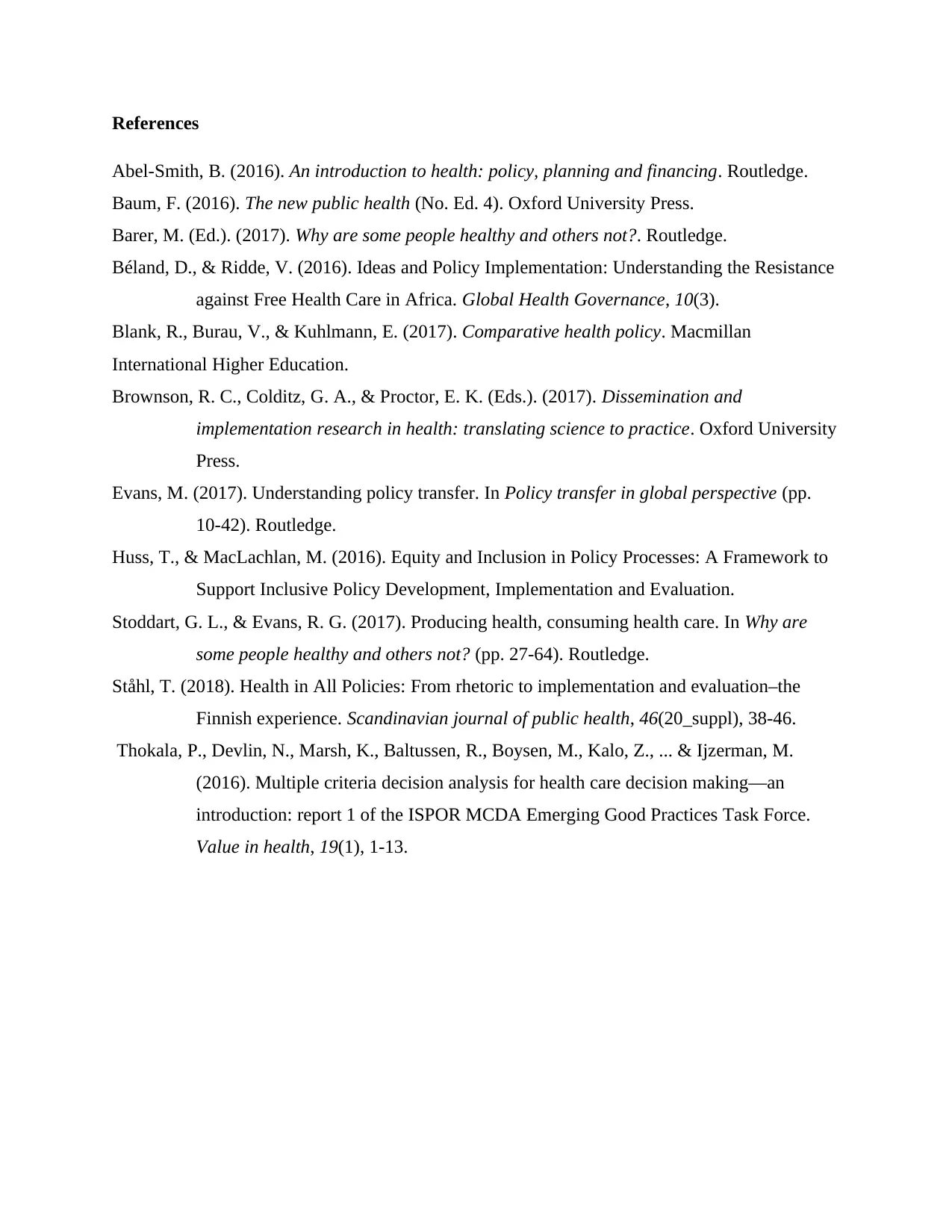
References
Abel-Smith, B. (2016). An introduction to health: policy, planning and financing. Routledge.
Baum, F. (2016). The new public health (No. Ed. 4). Oxford University Press.
Barer, M. (Ed.). (2017). Why are some people healthy and others not?. Routledge.
Béland, D., & Ridde, V. (2016). Ideas and Policy Implementation: Understanding the Resistance
against Free Health Care in Africa. Global Health Governance, 10(3).
Blank, R., Burau, V., & Kuhlmann, E. (2017). Comparative health policy. Macmillan
International Higher Education.
Brownson, R. C., Colditz, G. A., & Proctor, E. K. (Eds.). (2017). Dissemination and
implementation research in health: translating science to practice. Oxford University
Press.
Evans, M. (2017). Understanding policy transfer. In Policy transfer in global perspective (pp.
10-42). Routledge.
Huss, T., & MacLachlan, M. (2016). Equity and Inclusion in Policy Processes: A Framework to
Support Inclusive Policy Development, Implementation and Evaluation.
Stoddart, G. L., & Evans, R. G. (2017). Producing health, consuming health care. In Why are
some people healthy and others not? (pp. 27-64). Routledge.
Ståhl, T. (2018). Health in All Policies: From rhetoric to implementation and evaluation–the
Finnish experience. Scandinavian journal of public health, 46(20_suppl), 38-46.
Thokala, P., Devlin, N., Marsh, K., Baltussen, R., Boysen, M., Kalo, Z., ... & Ijzerman, M.
(2016). Multiple criteria decision analysis for health care decision making—an
introduction: report 1 of the ISPOR MCDA Emerging Good Practices Task Force.
Value in health, 19(1), 1-13.
Abel-Smith, B. (2016). An introduction to health: policy, planning and financing. Routledge.
Baum, F. (2016). The new public health (No. Ed. 4). Oxford University Press.
Barer, M. (Ed.). (2017). Why are some people healthy and others not?. Routledge.
Béland, D., & Ridde, V. (2016). Ideas and Policy Implementation: Understanding the Resistance
against Free Health Care in Africa. Global Health Governance, 10(3).
Blank, R., Burau, V., & Kuhlmann, E. (2017). Comparative health policy. Macmillan
International Higher Education.
Brownson, R. C., Colditz, G. A., & Proctor, E. K. (Eds.). (2017). Dissemination and
implementation research in health: translating science to practice. Oxford University
Press.
Evans, M. (2017). Understanding policy transfer. In Policy transfer in global perspective (pp.
10-42). Routledge.
Huss, T., & MacLachlan, M. (2016). Equity and Inclusion in Policy Processes: A Framework to
Support Inclusive Policy Development, Implementation and Evaluation.
Stoddart, G. L., & Evans, R. G. (2017). Producing health, consuming health care. In Why are
some people healthy and others not? (pp. 27-64). Routledge.
Ståhl, T. (2018). Health in All Policies: From rhetoric to implementation and evaluation–the
Finnish experience. Scandinavian journal of public health, 46(20_suppl), 38-46.
Thokala, P., Devlin, N., Marsh, K., Baltussen, R., Boysen, M., Kalo, Z., ... & Ijzerman, M.
(2016). Multiple criteria decision analysis for health care decision making—an
introduction: report 1 of the ISPOR MCDA Emerging Good Practices Task Force.
Value in health, 19(1), 1-13.
⊘ This is a preview!⊘
Do you want full access?
Subscribe today to unlock all pages.

Trusted by 1+ million students worldwide
1 out of 6
Related Documents
Your All-in-One AI-Powered Toolkit for Academic Success.
+13062052269
info@desklib.com
Available 24*7 on WhatsApp / Email
![[object Object]](/_next/static/media/star-bottom.7253800d.svg)
Unlock your academic potential
Copyright © 2020–2025 A2Z Services. All Rights Reserved. Developed and managed by ZUCOL.



